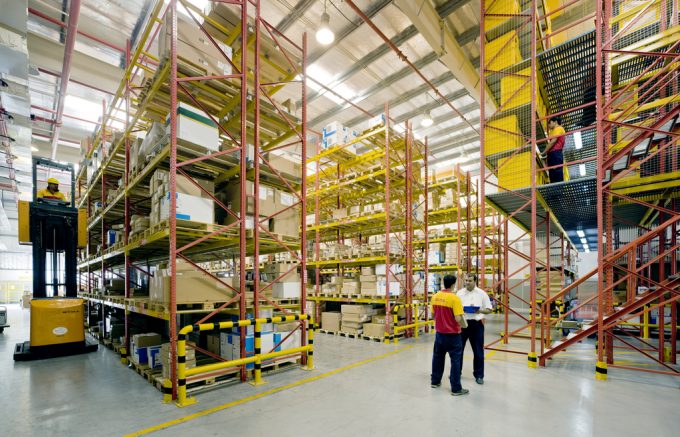DHL lowers profit expectations after weaker-than-expected Q3
DHL singled out its Global Forwarding division for a weaker-than-expected third quarter, and confirmed it ...
ATSG: UPDATEMAERSK: QUIET DAY DHL: ROBOTICSCHRW: ONE CENT CLUB UPDATECAT: RISING TRADEEXPD: TRUMP TRADE LOSER LINE: PUNISHEDMAERSK: RELIEF XPO: TRUMP TRADE WINNERCHRW: NO JOYUPS: STEADY YIELDXPO: BUILDING BLOCKSHLAG: BIG ORDERLINE: REACTIONLINE: EXPENSES AND OPERATING LEVERAGELINE: PIPELINE OF DEALS
ATSG: UPDATEMAERSK: QUIET DAY DHL: ROBOTICSCHRW: ONE CENT CLUB UPDATECAT: RISING TRADEEXPD: TRUMP TRADE LOSER LINE: PUNISHEDMAERSK: RELIEF XPO: TRUMP TRADE WINNERCHRW: NO JOYUPS: STEADY YIELDXPO: BUILDING BLOCKSHLAG: BIG ORDERLINE: REACTIONLINE: EXPENSES AND OPERATING LEVERAGELINE: PIPELINE OF DEALS

DHL operates an “abhorrent, hostile and repressive” environment for workers, it was claimed today.
It’s a policy “originating from the heart of the company in Germany”, alleges a report published by the ITF, the International Transport Workers’ Federation..
But the German logistics behemoth argues it is too big to arrange an international agreement with its global workforce.
The independent report claims to uncover “serious abuses” in DHL’s treatment of workers in Colombia, Chile and Panama.
It was commissioned just as two years of talks between the UNI Global Union and DHL, under the auspices of the OECD – triggered by a complaint in 2013 – came to a close.
To back its allegations, the report includes examples of a worker who sustained chronic injuries due to poor training; 42 workers sacked for union activity; evidence of DHL faking a customer letter to fire the son of a union official; and claims that DHL monitors employee conversations and intercepts union members’ phone calls.
These actions go against DHL’s own code of conduct as well as labour rules, said the ITF.
And the author of the report, Dr Victor Figueroa Clark of the London School of Economics, said: “The company’s code should make DHL a beacon of good conduct in Latin America. Sadly, the evidence from the workers I interviewed paints an overwhelmingly different picture.
“The multiple, frequent and institutional anti-union practices described in this report are difficult to interpret as anything but the result of an anti-union policy originating from the heart of the company in Germany”.
DHL told The Loadstar there was only one new allegation in the report it refuted – the rest were “resolved during the period of continued dialogue with UNI/ITF,” said Tish Clyde, SVP, corporate HR international.
She added: “We are committed to continuing the dialogue with the global unions, yet they appear to want it conditional upon DP-DHL Group signing an international framework agreement.
“We do not see such an agreement as practicable. We have around 500,000 employees in more than 220 countries and territories and we work with many employee representatives around the world.
“We aim to manage issues locally, with the people closest to the situation, with the best understanding of their specific market environments.”
The ITF, however, alleges that DHL continued to mistreat its workers even while the talks were continuing – a breach of standards and good faith, it says.
“DHL has been found out,” said Sharan Burrow, general secretary of the International Trade Union Confederation. “We now have proof that it’s breaking its own much-trumpeted code of conduct – and that the management in Bonn know it.
“People in Germany, and around the the world, will be shocked that a key German company is treating staff in this abhorrent manner. It’s time for DHL to get its house in order.”
DHL’s Ms Clyde argued: “Of course we have in place global standards, set out in our code of conduct, which expressly includes the right to join a union as well as the protection of human rights.
“Deutsche Post DHL Group is also a signatory of the UN Global Compact. We have systems and processes in place to ensure these global standards are implemented around the world, including independently managed compliance hotlines to handle employees’ complaints. In 2015 we launched a training programme for 70,000 managers, specifically focused on employee relations.”
But the report says only two conclusions were possible after reviewing the evidence. Neither bodes well for DHL management.
“There is a systemic incentive to ignore the code of conduct, which originates directly from DP-DHL headquarters in Germany, or DHL management in Latin America has an anti-union ‘subculture’, in violation of DHL’s own code of conduct, that is known, and tacitly approved, by DP-DHL headquarters in Germany.
“Put simply: in these three countries, DHL has grievously and systematically failed to live up to international standards, as well as its own procedures, aspirations and promises. “
Comment on this article